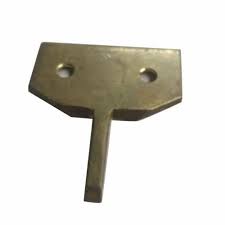
Typically made from high-grade forged or cast steel, anvil blocks are heat-treated to provide excellent toughness and wear resistance. The top surface, often referred to as the "face," is polished flat to create an even workspace, while the body of the anvil adds weight and stability. In many cases, anvils are mounted to bases or frames to reduce vibration and improve safety. Some designs may include specialized features like hardy holes or pritchel holes for tool placement and additional functionality.
Anvil blocks come in various sizes, shapes, and configurations depending on their application. Smaller anvils are used in hand-tool workshops and jewelers’ benches, while large industrial anvils are used in heavy-duty drop forging or power hammer operations. The design may vary from traditional single-horn anvils to more modern, block-style anvils with rectangular profiles that provide multiple working surfaces. Despite these differences, the core purpose remains the same: to provide a reliable striking surface that won’t compromise under repeated force.
Proper maintenance of anvil blocks is crucial for long-term effectiveness. Regular inspection for cracks, dents, or surface wear is important, especially in high-use environments. In cases where the face becomes damaged, resurfacing or re-hardening treatments can restore the anvil's functionality. When used and maintained correctly, anvil blocks can serve reliably for decades, making them one of the most durable and cost-effective beating parts in any workshop or industrial setting.
We Hope You Find What You are Looking for
Anvil blocks are fundamental components in various forging and metal shaping processes. They serve as the sturdy, immovable base upon which metal is hammered, shaped, or flattened. Designed to absorb and reflect impact energy, anvil blocks help ensure that the force from striking tools is fully directed into the workpiece. Their mass and hardness make them ideal for resisting deformation, which is critical for precision work in both manual blacksmithing and industrial forging operations.
Frequently Asked Questions






